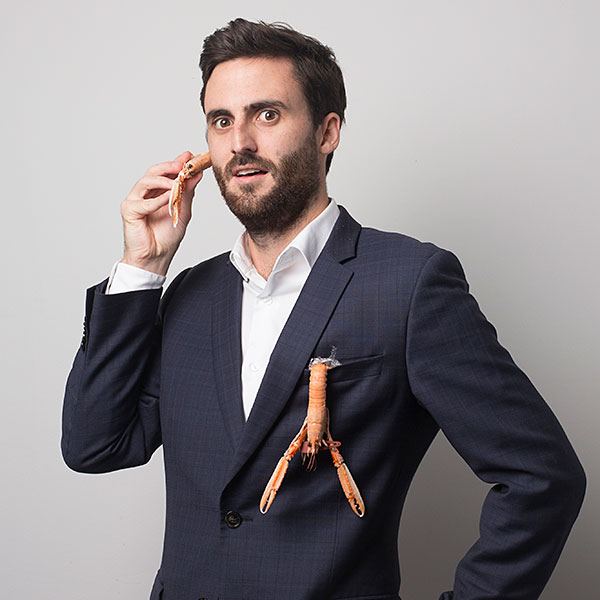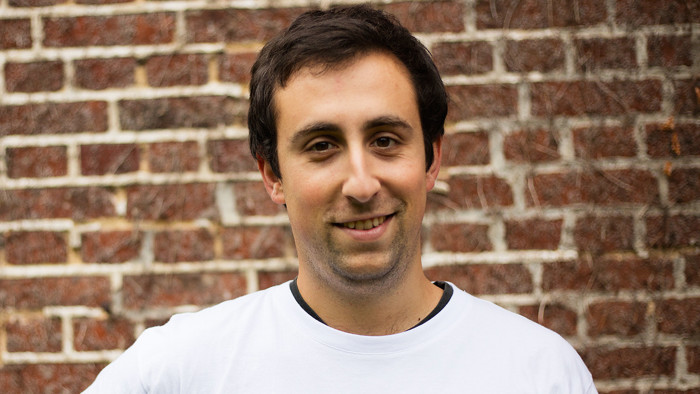How business school classmates cooked up an online chef service
Simply sign up to the Business education myFT Digest -- delivered directly to your inbox.
Stephen Leguillon and Giorgio Riccò lived for a year with no salary, living off their savings while trying to figure out the best business model for their idea of fine dining booked online. On the upside, however, they ate like kings.
The pair had hit it off as masters in management students at ESCP Europe business school in Berlin. They decided after graduating to launch a food start-up together in Paris, where Leguillon had connections and which they felt was an ideal market for gastronomes.
The first iteration of their business involved delivering food prepared by professional chefs, several of which Leguillon knew from his schooldays in France. What they lacked was enough customers to create a critical mass for testing the service, so the founders would include themselves on delivery addresses. “We ate a lot of chef-prepared meals for the first couple of years,” Leguillon recalls. “I really didn’t cook much myself.”

Leguillon had experience with food start-ups, having co-founded a takeaway ordering service, Appetise.com, while studying for an undergraduate management degree at Warwick Business School in the UK.
Having returned to the student lifestyle at ESCP, the pair felt prepared for the extended period of living frugally that is the lot of those creating companies from scratch.
“Launching a company right after graduation from university is perfect,” Leguillon says, adding that he turned down a job offer from Bank of America Merrill Lynch in London so that he could have a second attempt at entrepreneurship. “You can always get a job a year or two after graduating, but leaving a comfortable job to start a company is harder,” he says.
Business school not only brought the founders together but provided them with what Leguillon says was one of their biggest assets at the time, the alumni network.

It was at an annual event the business school holds for alumni-led start-ups, called Made in ESCP, that the pair found their first investor, Laurent Sachs. His €50,000 cheque supplemented the founders’ savings to get them to launch stage. They also found their product manager, Frédéric Tan, who graduated a year after them from ESCP’s masters in management programme.
The service that the team eventually launched in March 2013 was an online platform for booking private chefs, which they named La Belle Assiette (meaning “the beautiful dish”).
A turning point came a week later, when for the first time a client the founders did not know spent €550 to book a chef for a dinner. “This was the validation that we were bringing value to clients and could build a business from there,” Leguillon says. Until then, they had tested the technology with orders from friends and family, a much easier group to reach than outsiders.
Another signal that they were doing something right was that chefs were willing to pay the commission on bookings the service generated.
Jargon buster: ‘ . . . preneur’
Entrepreneurs do not make things. Inventors do that. But the entrepreneurial community is responsible for making a lot of new words, usually by snatching bits of old ones and forcing them together.
The most jarring example of this is the tacking on of “–preneur” to the end of other words, usually to emphasise some newly discovered trend in a group of people starting businesses.
An early example of this was the use of “mumpreneur”, which was not only irritating but a little patronising in that it seemed to imply we should be surprised that mothers are capable of doing a productive job while raising children.
Presumably the founder of the “oldpreneur” blog felt he was helping a disadvantaged group in the youth-worshipping world of tech start-ups. One can only wonder what the website for youngpreneurs — for indeed there is one — is trying to do for the world of start-ups, given that it is a culture that seems to idolise youth.
I am not alone in my concern about the “–preneur” invasion. Matt Smith, co-founder of the Centre for Entrepreneurs, a UK think-tank dedicated to promoting business creation, recently got in touch to point out the use of the word “homeless-preneur” by a former contestant on reality show The Apprentice (who said he would invest up to £150,000 in the right business idea from a homeless person). One can only guess where the people this made-up word refers to would be expected to work on their business plan.
It feels like a moment to end this madness. The world needs entrepreneurs to fix problems. However, the term “entrepreneur” is not a word in need of improvement, so please, jargon creators, leave it alone.
A few months later, the founders had raised a further €250,000 from angel investors. La Belle Assiette now operates in six countries, with 740 caterers offering their services to clients. These range from catering for dinner parties and corporate events to upmarket lunch boxes. The business has 28 employees and has raised €3m in three funding rounds to finance further expansion.
This April, the company launched a second service for its Paris and Berlin customers: a marketplace for deliveries from caterers. The founders hope to roll the service out across La Belle Assiette’s other markets in the future.
“We are still focused on growing our business, so we are investing heavily in all markets and in our product,” Leguillon says. “Our main priority is to bring this service to everyone, as fast as possible, so we are not yet striving to reach break-even, but know how to get there if and when needed.”
The biggest challenge is hiring good people, according to Leguillon, who says that this takes about a third of his time. It is a skill he is still learning, he adds, mainly by discussing hiring techniques with shareholders, his fellow founders and by spending a lot of time interviewing.
Passion, says Leguillon, is the main ingredient that makes the business work. “It’s such hard work, that you need to love what you are doing,” he says, adding that he had been lucky to experience a lot of good cooking through his previous work as an investment banking analyst.
“Food is universal, everyone understands it and bankers definitely know about it,” Leguillon adds. “That’s probably why bankers either run foodtech or fintech start-ups.”
Comments